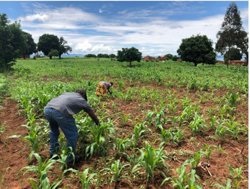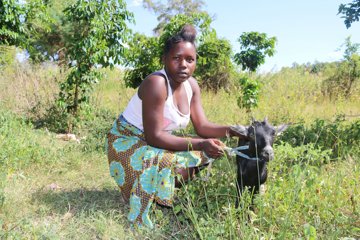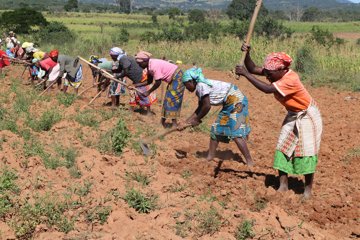‘Finance Development Projects that Stimulate Startups and Build a Local Ecosystem’
For ten years, the Netherlands invested in the Geodata for Agriculture and Water (G4AW) programme. In this series, key players reflect on the past and look towards the future. Taco de Nies of Kres, together with partners, developed automated communication channels and services for farmers in Angola.
How did you become involved in the G4AW programme?
‘After working as a consultant on G4AW, I had the opportunity to realise a project with partners in Angola and the Netherlands. This became Mavo Diami (Good Land). The idea was to build a new, local organisation that could operate independently and make an impact for small food producers in Angola.’
What was the Mavo Diami project about?
‘We assisted small farmers with digital agricultural advice, supporting a transition to regenerative agriculture. This approach values nature, the environment, climate, and social surroundings as much as a good harvest. Together with partners in Angola (World Vision, Seiva, Novagrolider) and the Netherlands (Future Water, eLeaf, Aquator, Weather Impact, Wageningen University), we shaped the startup Kres and developed unique services based on weather and satellite data, accessible via a chatbot and a voicebot.’

© Kres
What should we imagine with this?
‘Like many other G4AW projects, we provide agricultural advice: what crop should a farmer plant, when to fertilise or irrigate to optimise the harvest, and the best time to harvest. We also use feedback from the farmers, who can communicate via chat or spoken messages in Portuguese. This is where Kres is unique. Instead of one-way traffic via SMS, Kres engages in a dialogue with farmers, albeit automated.’
How else did Mavo Diami stand out?
‘We faced the question: how do you integrate small farmers into a larger network without losing their autonomy? Small farmers lack access to large agricultural businesses and other market players. They need an “agricultural advisory service 2.0”, a network of entrepreneurs and partners to help them with knowledge, services, and market access for quality seeds and other necessary inputs, as well as connections to the market for their produce. Novagrolider was instrumental in starting the project and Kres, and then we found a local partner in Seiva to further develop and expand this ecosystem.’
That sounds easier said than done. What obstacles did you encounter?
‘The biggest challenge is finding the right local partners and working with them in a decentral manner. When a large NGO gets involved, many farmers think: they have money, they will sort everything for us. This leads to the traditional project approach with goals and lots of subsidy money to achieve them. What you want are passionate and driven local organisations to lead the way. Start small, like a startup, and then grow steadily and learn together. This approach embeds a business-like mentality in both the startup and the farmers.’
Not all farmers are entrepreneurial!
‘One important insight confirmed once again is that farmers vary worldwide, including in Angola. Some grow what they need for themselves and their families. These farmers also need services, but creating the right propositions for them is always challenging, especially in Angola where mobile payment services like M-Pesa, well-known elsewhere in Africa, are absent. Then there are farmers who grow crops partly for the market. They want to sell their harvest. This group is easier to reach with propositions. They are focused on improving their production, want to farm “professionally”, and are willing to pay for services that help them in their work.’
How do you reach this target group?
© Kres
‘Mainly through a network of local agents who understand the culture and know exactly what small farmers need to improve their quality. Radio is also an effective medium, as it is widely listened to in Angola. Additionally, you can reach a large group of younger farmers via Facebook, who have smartphones with internet access.’
Project Mavo Diami was the final part of G4AW. What conclusions do you draw from your experiences with this programme?
‘G4AW has developed many good products and services. The focus now should be on embedding these locally. All attention should go to products and services that contribute to the integral improvement of farmers’ welfare, their land, and their environment, where the results (outcomes) form the basis for financing the information services that actually generate a positive impact. This ensures not only that farmers are willing to pay, but also opens up other forms of financing or payments to cover service costs. Only then do the services have a right to exist and can be scaled up1.’
Can such initiatives take off without large government subsidies?
‘Subsidies can be a catalyst. My advice would be: start with small investments. Finance ideas like startups. From idea to pilots to ‘minimum viable products’, give them the chance to iterate and ensure that a service and organisation are set up from the start that can scale up. At each step, you can determine whether it makes sense to make new, larger investments. Set qualitative, substantial goals and reward results based on the proven added value of the service and its potential to scale. This is not just about the product but especially about the teams, partnerships, and connections created. Look at a stable advisory organisation that ensures the right services can exist in the long term.’
Will Kres’ wor
© Kres
k still exist in Angola in ten years?
‘I see in Seiva a partner that is steadily building step by step. A locally embedded team with passionate people and partnerships that strengthen farming communities where Kres’ services can evolve. The services we developed with Kres will adapt to whatever is needed for the future of small farmers in Angola. I also see opportunities for introducing the Kres ecosystem in other countries. Expanding to Mozambique seems logical, and we’re eager to start there.’
1Note: Rabobank ACORN services are an example of this.